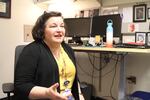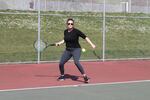Editor's note: This story has been updated to remove guidance that does not comply with Oregon and Washington's new social distancing requirements.
For 30 years, Susan Mayea ran Park Place Gifts and Jewelry in downtown Portland. She’s 70 now and lives with her husband in the Mt. Tabor neighborhood.
Initially, she said she wasn’t worried about the coronavirus because it was in China and Europe. But the last couple of weeks have been hard.
“Seeing the spread and seeing all the fear and the death and the hospitalizations really made it a reality," Mayea said.
“It’s very fearful, you try to deal with the fear and that anxiety of it. And staying home is actually a calmness because you’re not out there.”

Initially, Susan Mayea wasn’t worried about the coronavirus because it was in China and Europe. But the last couple of weeks have been hard.
Susan Mayea
Psychologist Dr. Robin Henderson is head of behavioral health at Providence Health. She said anxiety is expected and appropriate when dealing with an unfamiliar disease like this.
“We don’t know how this is going to play out. We’re watching what’s happening very quickly in Italy. We’re watching a lot of people die. And we’re not able to control it,” Henderson said.
So what can people do to feel more in control?
“The biggest thing that you can do is get yourself into a normal schedule.”
That means getting dressed in the morning, having a proper breakfast, and setting up things to do. If like Mayea, you’re retired and at home, schedule some time for gardening, another block of time for cooking, maybe another for a nap.
If you’re working from home for the first time, set up a spot specifically dedicated to work.
Some psychologists suggest taking breaks, like working for 50 minutes, then taking 10 minutes off.
They also recommend having a proper lunch. Otherwise, you could end up raiding the cookie jar in the evening, then tossing and turning all night because you’re too sugared-up to sleep.

Psychologist Dr. Robin Henderson thinks setting up a regular schedule, limiting exposure to news and exercising outside can help keep anxiety at bay.
Kristian Foden-Vencil / OPB
Henderson said balanced, scientific information is also important. So find a trusted news source, then don’t over-do it.
“Limit the amount of information you take in during the day. If all we’re hearing (is) all COVID and all bad, all of the time, that’s really really stressful.”
She also suggests trying to put the pandemic in context.
“Part of what we’ve got to do is remember that for most people, the vast majority of people who get this don’t need the hospital," Henderson said. "They can self-quarantine, and it’s going to be a bad cold and they’re going to be OK.”
When President Donald Trump was asked how long it might take before the country returns to something resembling normal, he responded maybe the summer. But Henderson thinks it’s best not to think too far ahead.
“I like to think of things in two-week chunks," she said. "What’s my life going to look like for the next two weeks, and how am I going to manage that?"
Henderson said a certain degree of anxiety is appropriate, so don’t worry about worrying. But people should seek professional help if they can no longer perform everyday functions, like getting out of bed or cooking. She said care does not have to be face-to-face. Health systems are conducting visits over the internet and crisis lines like Lines-For-Life are still being staffed.

Writer Brooke Bass takes a break from working at home on the Gabriel Park tennis courts.
Kristian Foden-Vencil / OPB
But one of the best ways to deal with the anxiety surrounding coronavirus is to get outside, Henderson said.
Lots of people seem to be doing just that.
On Wednesday at Gabriel Park in Southwest Portland, people were biking, skateboarding and hiking. Writer and recipe developer Brooke Bass was playing tennis with her husband.
“We’ve been pretty much self-quarantined since last Friday. He plays tennis pretty regularly and we live a block away from the park," Bass said. "So we figured we get out, get some fresh sunshine and knock the ball around."
With tennis, it’s easy to observe the 6-foot social distancing rule. And most people in Gabriel Park seemed to be keeping a distance, at least until the ice cream van turned up and kids swarmed around it.
